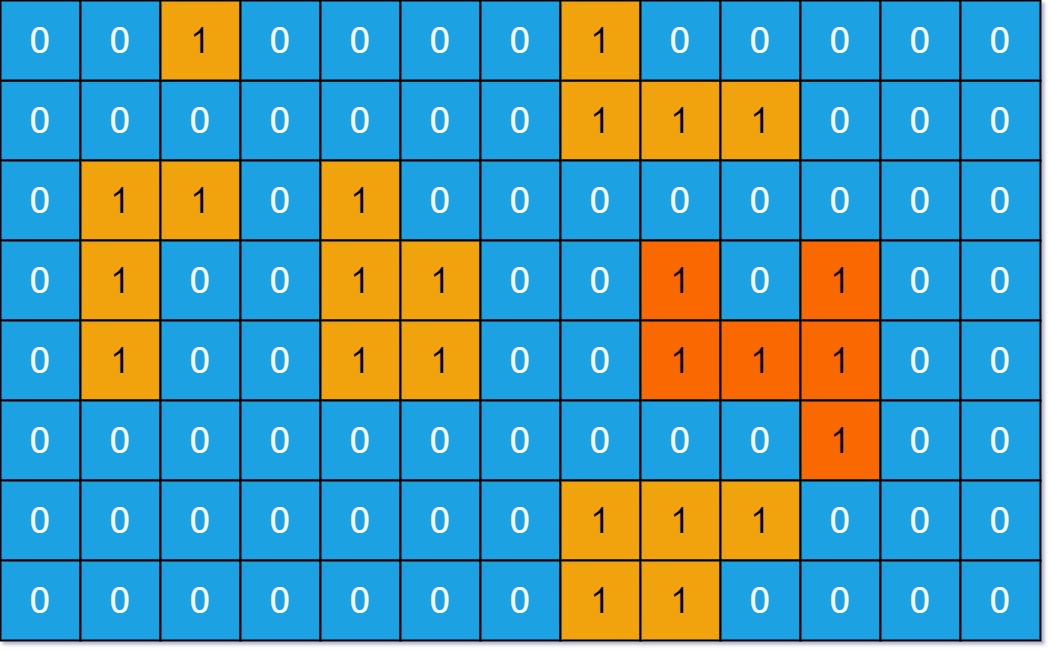Description
You are given an m x n binary matrix grid. An island is a group of 1’s (representing land) connected 4-directionally (horizontal or vertical.) You may assume all four edges of the grid are surrounded by water.
The area of an island is the number of cells with a value 1 in the island.
Return the maximum area of an island in grid. If there is no island, return 0.
Example 1:

Input: grid = [[0,0,1,0,0,0,0,1,0,0,0,0,0],[0,0,0,0,0,0,0,1,1,1,0,0,0],[0,1,1,0,1,0,0,0,0,0,0,0,0],[0,1,0,0,1,1,0,0,1,0,1,0,0],[0,1,0,0,1,1,0,0,1,1,1,0,0],[0,0,0,0,0,0,0,0,0,0,1,0,0],[0,0,0,0,0,0,0,1,1,1,0,0,0],[0,0,0,0,0,0,0,1,1,0,0,0,0]] Output: 6 Explanation: The answer is not 11, because the island must be connected 4-directionally.
Example 2:
Input: grid = 0,0,0,0,0,0,0,0 Output: 0
Constraints:
m == grid.lengthn == grid[i].length1 <= m, n <= 50grid[i][j]is either0or1.
Code
code 的邏輯和 Flood Fill 大同小異。 Time Complexity: , Space Complexity:
BFS
class Solution {
public:
int numIslands(vector<vector<char>>& grid) {
int island = 0;
vector<int> dir = {0, 1, 0, -1, 0};
int n = grid.size(), m = grid[0].size();
for(int i = 0; i < grid.size(); i++) {
for(int j = 0; j < grid[i].size(); j++) {
if(grid[i][j] == '1') {
grid[i][j] = '0';
island++;
queue<pair<int, int>> q;
q.push({i, j});
while(!q.empty()) {
auto p = q.front();
q.pop();
for(int k = 0; k < 4; k++) {
int x = p.first + dir[k], y = p.second + dir[k + 1];
if(x >= 0 && x < n && y >= 0 && y < m && grid[x][y] == '1') {
grid[x][y] = '0';
q.push({x, y});
}
}
}
}
}
}
return island;
}
};DFS
class Solution {
public:
int numIslands(vector<vector<char>>& grid) {
int n = grid.size();
int m = grid[0].size();
vector<vector<int>> visited(n, vector<int>(m, 0));
int count = 0;
for(int i = 0; i < n; i++) {
for(int j = 0; j < m; j++) {
if(!visited[i][j] && grid[i][j] == '1') {
count++;
dfs(i, j, visited, grid);
}
}
}
return count;
}
void dfs(int x, int y, vector<vector<int>>& visited, vector<vector<char>>& grid) {
visited[x][y] = 1;
int n = grid.size();
int m = grid[0].size();
if(x + 1 < n && !visited[x+1][y] && grid[x+1][y] == '1') dfs(x+1, y, visited, grid);
if(x - 1 >= 0 && !visited[x-1][y] && grid[x-1][y] == '1') dfs(x-1, y, visited, grid);
if(y + 1 < m && !visited[x][y + 1] && grid[x][y + 1] == '1') dfs(x, y+1, visited, grid);
if(y - 1 >= 0 && !visited[x][y - 1] && grid[x][y - 1] == '1') dfs(x, y-1, visited, grid);
return;
}
};